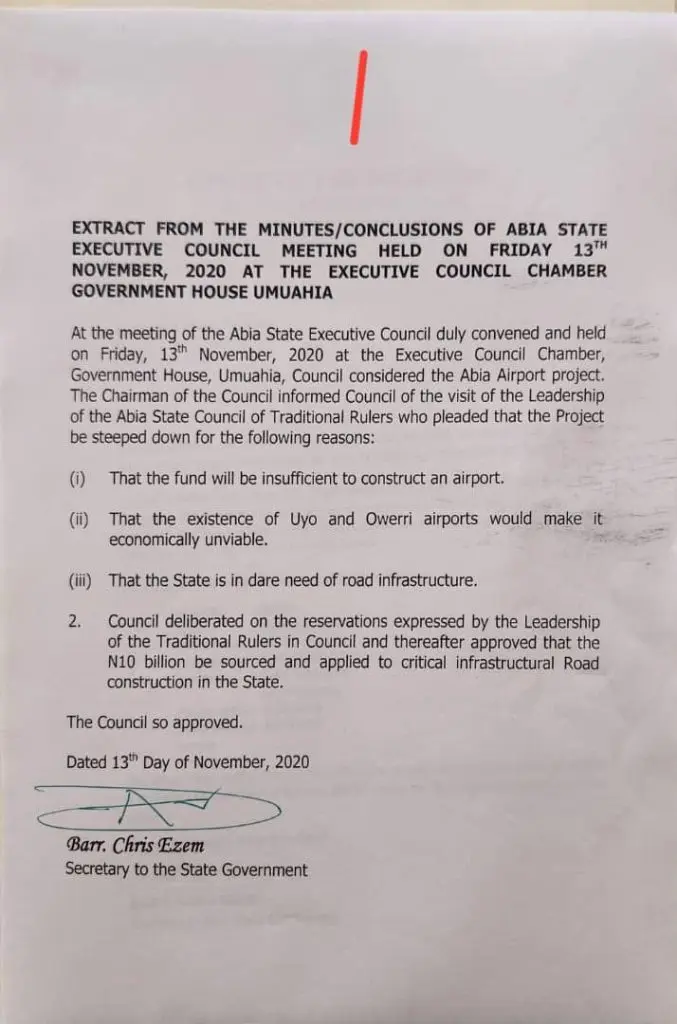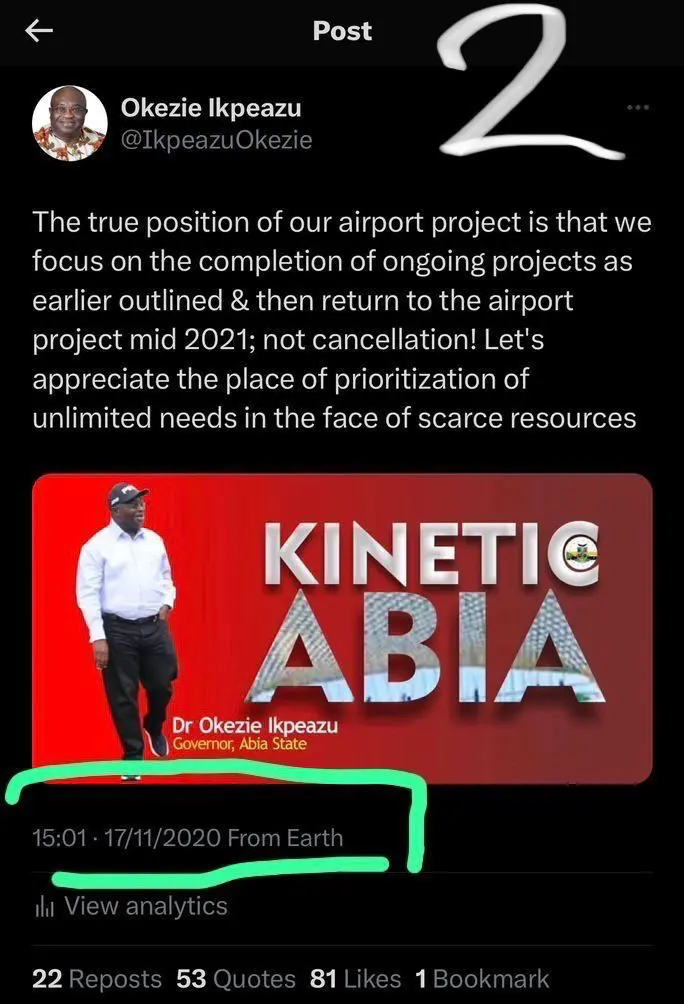
In a recent statement, Former Commissioner for Information; Trade & Investment during the tenure of former Abia State Governor, Okezie Ikpeazu, provided additional explanations regarding the contentious forensic audit report released by Alex Otti’s government.
Kalu highlighted some of Ikpeazu’s accomplishments and delved into the inception and execution of the airport project.
The statement unveiled various details and was made public on Sunday.
Here are the key points…
“I have come across a publication from the ‘Whistler’ Blog allegedly endorsed by Chief James Chijioke Ume (Koos), purportedly Governor Alex Otti’s close associate and possible successor, from Abam in Arochukwu LGA of Abia State. The publication aimed to continue the media onslaught and legal battle against former Abia State Governor, Dr. Okezie Ikpeazu, recycling the baseless accusations initially made by Governor Otti from the United States,” said Kalu.

“I served as a member of the Abia State Executive Council (Exco) and held the position of Honorable Commissioner for Information when the concept of developing the Abia Airport was first broached during the Exco meeting on 24th September 2020. Following the presentation at the Exco meeting, we endorsed the project and sanctioned the borrowing of N10bn from UBA Plc as the initial investment on behalf of the state, with the repayment structured through our FAAC account with the bank. It’s worth noting that at that time, the country was grappling with the aftermath of the COVID-19 pandemic, resulting in minimal FAAC and IGR revenues across all states,” he elaborated.
“After the Exco’s approval, the project’s implementation process commenced. The current Secretary to the State Government, Prof Kenneth Kalu, appointed by Governor Otti, can verify the accuracy of my account from the Exco records in his possession,” added Kalu.
“Shortly after the announcement of Exco’s endorsement of the airport project, Governor Okezie Ikpeazu met with the executives of the Abia State Traditional Rulers Council, led by HRM Eze Joseph Nwabekee,” he revealed.
“On the 13th of November 2020, Governor Okezie Ikpeazu disclosed to the members of the state executive council the outcome of his dialogue with representatives of the traditional rulers in Abia State. The traditional leaders had requested that the airport project be put on hold and the funds designated for it be redirected towards enhancing the road network in the state. They underscored the urgency of improving internal roads to further boost socio-economic activities in the state. Subsequently, Exco voted in favor of suspending the airport project and channeling the earmarked funds into road projects across the state,” Kalu detailed.
“Governor Ikpeazu publicly announced the suspension of the airport project on 17th November 2020 via his official X (formerly Twitter) handle (Attachments 2 & 3),” he continued.
“Presumably, Governor Ikpeazu had informed the Commissioner for Works about his intention to halt the Airport project in anticipation of Exco’s approval. Consequently, the State Ministry of Works identified road projects in the 2020 budget for funding using the N10 billion and allocated resources to the respective contractors,” he pointed out.
“Ferotex Construction Company, a reputable indigenous construction firm with anti-corruption credentials, was selected by the Ikpeazu administration as the lead contractor in the ‘contractor financier’ model with UBA (Attachment 4),” he disclosed.
“This mode of contractor financing is not uncommon in the public sector, as exemplified by a similar agreement entered into by the Alex Otti administration with Craneburg Construction Company for a N50bn (Attachment 5) facility earmarked for various road projects. These lead companies essentially act as intermediaries who receive the bulk amount and disburse payments to subcontractors, as banks are unlikely to engage in multiple agreements with all contractors,” Kalu clarified.
“Among the contractors and projects that I am aware of that received payments from the N10bn allocation were:
i. China Zonghghao for projects in Aba – N800,000,000
ii. Trackcare Construction Company for various projects in Aba – N1,035,000,000
iii. Ferrotex for projects in Aba – N1,500,000,000 and more.
“These outlined payments are not exhaustive, as they are based on records maintained during my tenure at Exco meetings. The Ministry of Works under Elder Bob Ogu and the Ministry of Finance under Dr Aham Uko would be better positioned to furnish a more comprehensive list. Alternatively, the current administration could refer to the relevant Ferotex project account,” Kalu added.

“A thorough audit investigation should primarily focus on verifying whether the allocated funds reached the intended companies and ascertaining the completion of the contracted work. Otti’s touted ‘one of the top 3 audit firms in the world’ failed to trace the money effectively, as expected of any reputable audit firm,” Kalu criticized.
“Claims suggesting the necessity of a ‘virement’ might stem from a misinterpretation of the situation. The road projects were already outlined in our approved budget, hence no additional house approval was required. All state revenues are typically directed towards financing the state budget, and following the approval to shift funds from the airport to road projects, in my perspective, no further legislative authorization was necessary,” he explained.
“I am confident that if any legal prerequisite for additional house of assembly approval existed, UBA Plc’s management would have sought and obtained it from the government before releasing the funds for the road initiatives. Individuals seeking evidence of such approval may contact UBA Plc directly. It’s essential to note that…
Governor Ikpeazu didn’t access the funds until November 26, 2020, due to a lien placed by the bank. The disbursements lasted until January 2021. Verification can be done through relevant UBA accounts by Auditors and Otti’s administration.
Virement involves transferring funds between financial accounts. The Airport and road projects needed to be in the 2020 budget for virement to be executed. The debate on the Airport project’s allocation is irrelevant as no N10bn was spent on it.
Governor Ikpeazu had access to documents related to the road project fund allocation. Any reputable audit firm could track the payment of N10bn to Ferotex and other construction companies listed.
Governor Alex Otti unjustly dismissed senior civil servants in Abia State who had worked with Governor Ikpeazu. The current skepticism is likely fueled by political vendetta rather than factual evidence.
It is disconcerting that Governor Otti leaked forensic audit documents to a blogger instead of using official platforms. The selective leakage indicates a lack of transparency and accountability.
Governor Ikpeazu should not respond to documents published by Otti’s blogger until he receives an official copy of the forensic audit report. The truth will prevail through legitimate channels, not media trials.
Governor Alex Otti will also be held accountable for his actions eventually. Transparency and accountability are crucial for good governance, irrespective of political affiliations.
The alleged financial mismanagement under Otti’s administration raises concerns. The diversion of taxpayer funds to questionable expenses while neglecting essential services is unacceptable.
Attempts to discredit opposition figures through media trials are undemocratic. A true leader focuses on development agendas, not vindictive actions against rivals.
Governor Otti’s behavior, as outlined by Dr. Alex Otti, contradicts principles of good leadership. Holding oneself to a higher standard is essential for effective governance.
The Airport controversy appears to be a diversion tactic from Otti’s governance failures. Evidence suggests Otti’s involvement with contractors like Ferotex Construction Company in various state projects.
Governor Otti’s false narratives raise doubts about his sincerity in governing the state and managing its resources responsibly. True leadership requires honesty and accountability.
